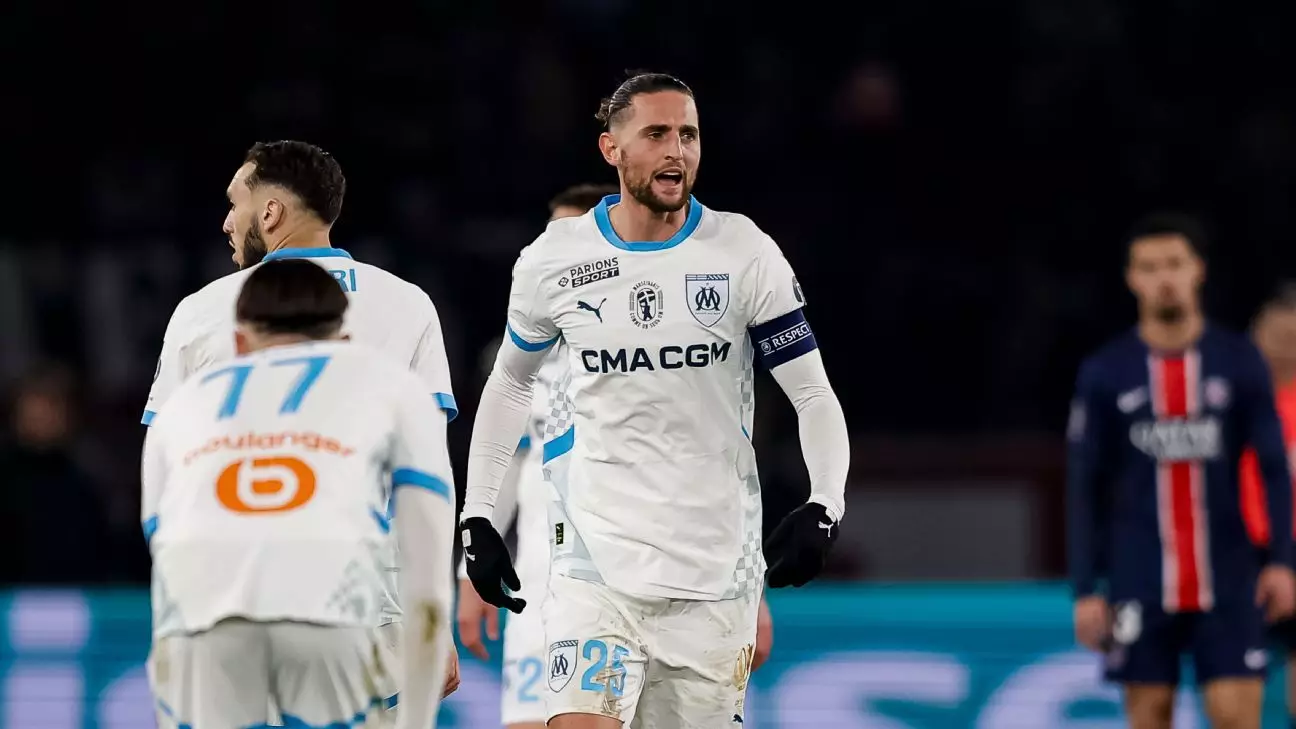In a gripping encounter that pitted Paris Saint-Germain (PSG) against their fierce rivals, Marseille, Adrien Rabiot’s return to the Parc des Princes highlighted not just a personal vendetta, but a national issue – the persistent intolerance within football culture. Rabiot, who once donned the PSG jersey with pride, now faced a barrage of hostility from fans who viewed his transfer to Marseille as betrayal. His subsequent social media outburst reflected not just anger, but a craving for dignity and respect in a sport marred by discriminatory behavior.
The 3-1 defeat for Marseille served as the backdrop for Rabiot’s poignant commentary on class, or rather, the apparent absence of it among vociferous sections of the PSG fanbase. His statement, “you can’t buy class,” is more than a critique of the club’s wealthy president, Nasser Al-Khelaifi; it is a broader condemnation of how money has obscured moral integrity in football. The words resonate well beyond the pitch, echoing sentiments shared by countless players, fans, and advocates who have faced similar indignities.
A Game Overshadowed by Toxicity
Unfortunately, the match transcended beyond the allure of on-field talent. Racist undertones and anti-gay chants disrupted the ambiance of competitive spirit, transforming the stadium into a battleground of discrimination. Rabiot’s remarks about insults hurled at him and suggestions of violence against his family betray the troubling reality in modern football – that some supporters wield their allegiance like a weapon, inflicting emotional harm with little regard for humanity.
What needs to be scrutinized is the apparent inconsistency in the enforcement of rules governing such behavior. Following complaints about the chants, Rabiot’s mother, Véronique, voiced her frustrations, questioning why the match was not halted when discriminatory slurs echoed through the stands. Indeed, it raises a critical point about accountability in football. Why do certain incidents escape scrutiny while others warrant immediate intervention? The reluctance to stop matches for anti-social behavior casts a long shadow on the sport’s integrity, suggesting a tacit endorsement of such vile actions.
The Broader Implications of Inaction
The reality is that incidents like these go beyond individual matches; they represent a systemic issue embedded within football culture. Campaign groups like Rouge Direct have implored authorities to take definitive action against racism and homophobia in football. They are right to demand accountability, pressing the ministers of sport, justice, and the French football federation to enact decisive measures against bigotry.
Yet, what remains disheartening is the repetitive nature of these dialogues within French football. Despite the imposition of fines and even closure of stadium sections in response to hateful chants, real progress remains elusive. In a society that prides itself on inclusivity, the continuation of such behavior exposes a troubling double standard that must be addressed. It is time for both the governing bodies and fans themselves to confront this ugly facet of football culture.
Rabiot: A Voice for Change
With prominent figures like Rabiot taking a stand, there lies hope that change can stem from this alarming predicament. Rabiot’s prominence in the league and international arena grants his voice weight; his call for class and respect reflects a collective yearning for a more dignified ethos within the sport. While fans may feel empowered in their loyalty, encouraging a culture of hate dilutes the integrity of a game that unites millions.
Adherence to principles of inclusion should not be relegated to mere slogans. It should involve tangible action, awareness campaigns, and educational initiatives aimed at fostering respect among fans. Rabiot’s declaration serves as a necessary reminder to take a firm stand against the unacceptable reality that has long plagued our beloved sport. As the landscape of football continues to evolve, perhaps the real test for clubs like PSG is not the acquisition of star talent but the cultivation of a culture grounded in respect and sportsmanship.
Through his bold remarks and ongoing resolution, Rabiot signifies more than a single player’s desire for respect; he embodies the collective hope for football that embraces all, free of hatred and discrimination.

